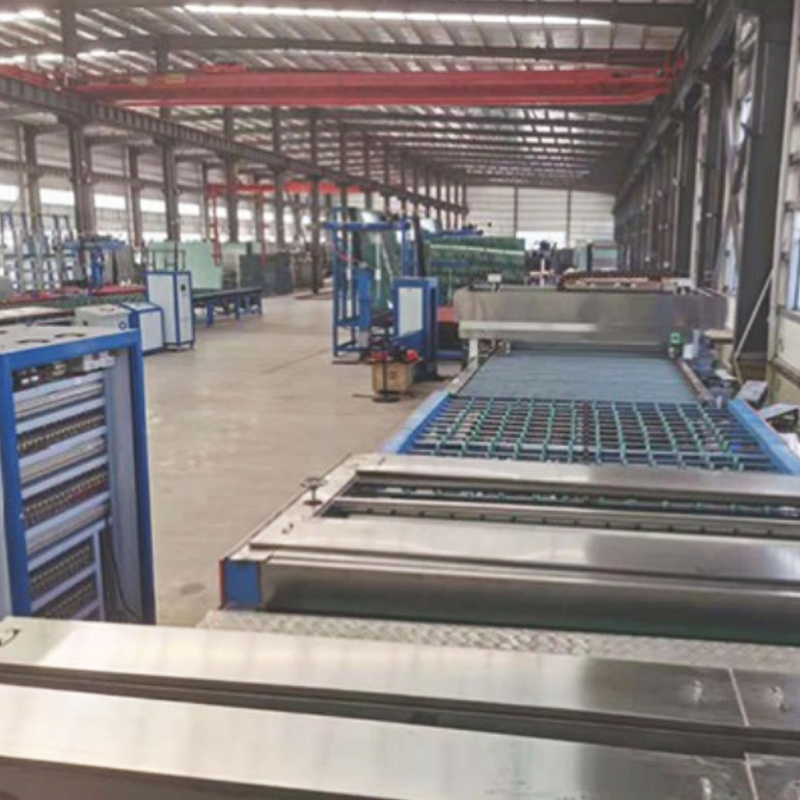Understanding Glass Coating Machines: Transforming the Steel Industry
Time:
2025-10-06 09:10
In the competitive landscape of the building and decorative materials industry, particularly in the steel sector, the use of glass coating machines has become increasingly significant. These machines apply a specialized glass coating to steel surfaces, enhancing their performance and visual appeal. But what exactly are glass coating machines, and how do they impact the steel industry?
Glass coating, also known as glass-like coating, is a process that involves applying a thin layer of glass to a substrate, in this case, steel. The primary function of this coating is to provide a protective layer that is resistant to environmental factors such as moisture, temperature fluctuations, and chemical exposure. This is particularly important for steel materials used in construction and decorative applications, where longevity and appearance are critical.
The operation of glass coating machines typically involves several stages. First, the steel substrate is prepped by cleaning and sometimes pre-treating the surface to ensure maximum adhesion of the glass coating. Once prepared, the steel is passed through the coating machine, where the glass material is applied. This process can involve spray techniques, dip coating, or other methods that ensure a uniform application of the glass layer. The coated steel then goes through a curing process, where heat or other methods are used to solidify the coating, enhancing its durability.
One of the standout benefits of using glass coating machines in the steel industry is the enhanced lifespan of coated products. Steel, when left untreated, is susceptible to rust and corrosion, which can lead to significant structural issues over time. However, the glass coating acts as a barrier, effectively preventing moisture and contaminants from reaching the steel surface. This results in a substantial reduction in maintenance costs and extends the lifespan of the materials used in construction projects.
Additionally, glass coatings provide aesthetic benefits. The smooth, reflective surface of the glass coating can significantly improve the visual appeal of steel products. This is particularly advantageous in architectural applications, where both functionality and aesthetics are paramount. Buildings and structures featuring glass-coated steel can achieve a modern, sleek look that appeals to contemporary design sensibilities.
Moreover, the use of glass coating machines aligns with sustainable practices in the construction industry. By improving the durability of steel products, these machines contribute to reducing the need for frequent replacements, thereby minimizing waste and lowering the overall environmental impact.
In conclusion, glass coating machines play a crucial role in enhancing the performance and aesthetics of steel materials in the construction and decorative sectors. By providing a robust protective layer and improving the visual appeal of steel products, these machines not only meet industry demands but also support sustainable construction practices. As the industry continues to evolve, the significance of glass coating technology will likely grow, offering even more innovative solutions to traditional challenges.
Glass coating, also known as glass-like coating, is a process that involves applying a thin layer of glass to a substrate, in this case, steel. The primary function of this coating is to provide a protective layer that is resistant to environmental factors such as moisture, temperature fluctuations, and chemical exposure. This is particularly important for steel materials used in construction and decorative applications, where longevity and appearance are critical.
The operation of glass coating machines typically involves several stages. First, the steel substrate is prepped by cleaning and sometimes pre-treating the surface to ensure maximum adhesion of the glass coating. Once prepared, the steel is passed through the coating machine, where the glass material is applied. This process can involve spray techniques, dip coating, or other methods that ensure a uniform application of the glass layer. The coated steel then goes through a curing process, where heat or other methods are used to solidify the coating, enhancing its durability.
One of the standout benefits of using glass coating machines in the steel industry is the enhanced lifespan of coated products. Steel, when left untreated, is susceptible to rust and corrosion, which can lead to significant structural issues over time. However, the glass coating acts as a barrier, effectively preventing moisture and contaminants from reaching the steel surface. This results in a substantial reduction in maintenance costs and extends the lifespan of the materials used in construction projects.
Additionally, glass coatings provide aesthetic benefits. The smooth, reflective surface of the glass coating can significantly improve the visual appeal of steel products. This is particularly advantageous in architectural applications, where both functionality and aesthetics are paramount. Buildings and structures featuring glass-coated steel can achieve a modern, sleek look that appeals to contemporary design sensibilities.
Moreover, the use of glass coating machines aligns with sustainable practices in the construction industry. By improving the durability of steel products, these machines contribute to reducing the need for frequent replacements, thereby minimizing waste and lowering the overall environmental impact.
In conclusion, glass coating machines play a crucial role in enhancing the performance and aesthetics of steel materials in the construction and decorative sectors. By providing a robust protective layer and improving the visual appeal of steel products, these machines not only meet industry demands but also support sustainable construction practices. As the industry continues to evolve, the significance of glass coating technology will likely grow, offering even more innovative solutions to traditional challenges.
glass coating machine
News







